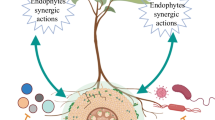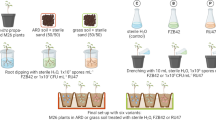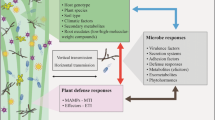Abstract
Rhizosphere colonization is a requirement for field applications of plant growth-promoting rhizobacteria (PGPR). Complex signal exchanges and mutual recognition occur between microbes and plants. Here, the phosphate-solubilizing strain Pseudomonas sp. P34, which is a type of PGPR with affinity to wheat, was isolated from a wheat rhizosphere via wheat germ agglutinin. A pTR102 plasmid harboring the luciferase luxAB gene was transferred into P34. The labeled strain (P34-L) was then used to track the temporal and spatial characteristics of rhizosphere colonization and examine the effects of colonization on wheat development. The transcript levels of the phosphate transporter gene TaPT4, a phosphorus deficiency indicator, in wheat roots were monitored by quantitative reverse transcription PCR (qRT-PCR). The results indicated that P34-L could survive within the wheat rhizosphere for a long time and colonize new spaces in the wheat rhizosphere following the elongation of wheat roots. Compared with uninoculated wheat plants, plants inoculated with P34-L exhibited significantly increased phosphorus accumulation in the leaves; seedling and root weight; total root length; root projection area; root surface area; and number of root tips, forks, and crossings, thus demonstrating the great value of applying this strain in wheat production by promoting root growth and dry matter accumulation. The downregulation of TaPT4 transcript levels in the wheat roots also suggested that a high-phosphorus environment was established by P34-L. These results lay a foundation for further research on the relationships between PGPR and their host plants. Moreover, a potentially ideal biofertilizer-producing strain for use in sustainable agriculture was developed.



Similar content being viewed by others
References
Adesemoye AO, Torbert HA, Kloepper JW (2008) Enhanced plant nutrient use efficiency with PGPR and AMF in an integrated nutrient management system. Can J Microbiol 54:876–886. https://doi.org/10.1139/w08-081
Ahmad F, Ahmad I, Khan MS (2008) Screening of free-living rhizospheric bacteria for their multiple plant growth promoting activities. Microbiol Res 163:173–181. https://doi.org/10.1016/j.micres.2006.04.001
Arikan S, Pirlak L (2016) Effects of plant growth promoting rhizobacteria (PGPR) on growth, yield and fruit quality of sour cherry (Prunus cerasus L.). Erwerbs-Obstbau 58:221–226. https://doi.org/10.1007/s10341-016-0278-6
Artursson V, Finlay RD, Jansson JK (2006) Interactions between arbuscular mycorrhizal fungi and bacteria and their potential for stimulating plant growth. Environ Microbiol 8:1–10. https://doi.org/10.1111/j.1462-2920.2005.00942.x
Bal HB, Nayak L, Adhya TK (2013) Isolation of ACC deaminase producing PGPR from rice rhizosphere and evaluating their plant growth promoting activity under salt stress. Plant Soil 366:93–105. https://doi.org/10.1007/s11104-012-1402-5
Bhardwaj D, Ansari MW, Sahoo RK, Tuteja N (2014) Biofertilizers function as key player in sustainable agriculture by improving soil fertility, plant tolerance and crop productivity. Microb Cell Fact 13:74–81. https://doi.org/10.1186/1475-2859-13-66
Bray RH, Kurtz LT (1945) Determination of total organic and available forms of phosphorus in soils. Soil Sci 59:39–45. https://doi.org/10.1097/00010694-194501000-00006
Cruz LF (2012) Calcium increases Xylella fastidiosa surface attachment, biofilm formation, and twitching motility. Appl Environ Microbiol 78:1321–1331. https://doi.org/10.1128/AEM.06501-11
De Hoff PL, Brill LM, Hirsch AM (2009) Plant lectins: the ties that bind in root symbiosis and plant defense. Mol Genet Genom 282:1–15. https://doi.org/10.1007/s00438-009-0460-8
Díaz CL, Melchers LS, Hooykaas PJJ, Lugtenberg BJJ, Kijne JW (1989) Root lectin as a determinant of host-plant specificity in the Rhizobium-legume symbiosis. Nature 338:579–581. https://doi.org/10.1038/338579a0
Dombrecht B, Vanderleyden J, Michiels J (2001) Stable RK2-derived cloning vectors for the analysis of gene expression and gene function in gram-negative bacteria. Mol Plant Microbe Interact 14:426–430. https://doi.org/10.1094/MPMI.2001.14.3.426
Duan J, Tian H, Drijber RA, Gao Y (2015) Systemic and local regulation of phosphate and nitrogen transporter genes by arbuscular mycorrhizal fungi in roots of winter wheat (Triticum aestivum L.). Plant Physiol Biochem 96:199–208. https://doi.org/10.1016/j.plaphy.2015.08.006
Gray EJ, Smith DL (2005) Intracellular and extracellular PGPR: commonalities and distinctions in the plant–bacterium signaling processes. Soil Biol Biochem 37:395–412. https://doi.org/10.1016/j.soilbio.2004.08.030
Gull M, Hafeez FY, Saleem M, Malik KA (2004) Phosphorus uptake and growth promotion of chickpea by co-inoculation of mineral phosphate solubilising bacteria and a mixed rhizobial culture. Aust J Exp Agric 44:623–628. https://doi.org/10.1071/EA02218
Guo CJ, Guo L, Li XJ, Gu JT, Zhao M, Duan WW, Ma CY, Lu WJ, Xiao K (2014) TaPT2, a high-affinity phosphate transporter gene in wheat (Triticum aestivum L.), is crucial in plant Pi uptake under phosphorus deprivation. Acta Physiol Plant 36:1373–1384. https://doi.org/10.1007/s11738-014-1516-x
Habibi S, Djedidi S, Prongjunthuek K, Mortuza MF, Ohkama-Ohtsu N, Sekimoto H, Yokoyoma T (2014) Physiological and genetic characterization of rice nitrogen fixer PGPR isolated from rhizosphere soils of different crops. Plant Soil 379:51–66. https://doi.org/10.1007/s11104-014-2035-7
Hinsinger P, Bengough AG, Vetterlein D, Young IM (2009) Rhizosphere: biophysics, biogeochemistry and ecological relevance. Plant Soil 321:117–152. https://doi.org/10.1007/s11104-008-9885-9
Hirsch AM (1999) Role of lectins (and rhizobial exopolysaccharides) in legume nodulation. Curr Opin Plant Biol 2:320–326. https://doi.org/10.1016/S1369-5266(99)80056-9
Holt JG, Krieg NR, Sneath PHA, Staley JT, Williams ST (1994) Bergey’s manual of systematic bacteriology, 9th edn. Williams and Wilkins, Baltimore
Idris EE, Iglesias DJ, Talon M, Borriss R (2007) Tryptophan-dependent production of indole-3-acetic acid (IAA) affects level of plant growth promotion by Bacillus amyloliquefaciens FZB42. Mol Plant Microbe Interact 20:619–626. https://doi.org/10.1094/MPMI-20-6-0619
Jeffries P, Gianinazzi S, Perotto S, Turnau K, Barea JM (2003) The contribution of arbuscular mycorrhizal fungi in sustainable maintenance of plant health and soil fertility. Biol Fertil Soils 37:1–16. https://doi.org/10.1007/s00374-002-0546-5
Kloepper JW, Beauchamp CJ (1992) A review of issues related to measuring colonization of plant roots by bacteria. Can J Microbiol 38:1219–1232. https://doi.org/10.1139/m92-202
Kloepper JW, Leong J, Teintze M, Schroth MN (1980) Enhanced plant growth by siderophores produced by plant growth-promoting rhizobacteria. Nature 286:885–886. https://doi.org/10.1038/286885a0
Levine D, Kaplan MJ, Greenaway PJ (1972) The purification and characterization of wheat-germ agglutinin. Biochem J 129:847–856. https://doi.org/10.1042/bj1290847
Livak KJ, Schmittgen TD (2001) Analysis of relative gene expression data using real-time quantitative PCR and the 2(-Delta Delta C(T)) Method. Methods 25:402–408. https://doi.org/10.1006/meth.2001.1262
Mavrodi OV, Mavrodi DV, Weller DM, Thomashow LS (2006) Role of ptsP, orfT, and sss recombinase genes in root colonization by Pseudomonas fluorescens Q8r1-96. Appl Environ Microbiol 72:7111–7122. https://doi.org/10.1128/AEM.01215-06
Mirzaei A, Naseri R, Soleymanifard A, Vazan S (2011) Effect of plant growth promoting rhizobacteria (PGPR) on agronomic characteristic and root colonization in fennel. Planta Med 77:1277–1277. https://doi.org/10.1055/s-0031-1282259
Mitnura T (1995) Homeostasis and transport of inorganic phosphate transport in plants. Plant Cell Physiol 36:1–7
Murphy J, Reley JP (1962) A modified single solution method for the determination of phosphate in natural waters. Anal Chim Acta 27:31–36. https://doi.org/10.1016/S0003-2670(00)88444-5
Nautiyal CS (1999) An efficient microbiological growth medium for screening phosphate solubilizing microorganisms. FEMS Microbiol Lett 170:265–270. https://doi.org/10.1111/j.1574-6968.1999.tb13383.x
Nelson LM (2004) Plant growth promoting rhizobacteria (PGPR): prospects for new inoculants. Crop Manage. https://doi.org/10.1094/CM-2004-0301-05-RV
Nielsen L, Li X, Halverson LJ (2011) Cell-cell and cell-surface interactions mediated by cellulose and a novel exopolysaccharide contribute to Pseudomonas putida biofilm formation and fitness under water-limiting conditions. Environ Microbiol 13:1342–1356
Olubajo B, Bacon C (2008) Electrotransformation of Bacillus mojavensis with fluorescent protein markers. J Microbiol Methods 74:102–105. https://doi.org/10.1016/j.mimet.2008.03.011
Pealoza E, Santiago M, Cabrera S, Muoz G, Corcuera LJ, Silva H (2017) Characterization of the high-affinity phosphate transporter PHT1;4 gene promoter of Arabidopsis thaliana in transgenic wheat. Biol Plant 61:455–462. https://doi.org/10.1007/s10535-016-0672-9
Polz MF, Cavanaugh CM (1998) Bias in template-to-product ratios in multitemplate PCR. Appl Environ Microbiol 64:3724–3730
Prosser JI (1994) Molecular marker systems for detection of genetically engineered micro-organisms in the environment. Microbiology 140:5–17. https://doi.org/10.1099/13500872-140-1-5
Raghothatna KG (1999) Phosphate acquisition. Annu Rev Plant Phys 61:665–693. https://doi.org/10.1146/annurev.arplant.50.1.665
Ramos C, Molina L, Molbak L, Ramos JL, Molin S (2000) A bioluminescent derivative of Pseudomonas putida KT2440 for deliberate release into the environment. FEMS Microbiol Ecol 34:91–102. https://doi.org/10.1111/j.1574-6941.2000.tb00758.x
Rana A, Saharan B, Joshi M, Prasanna R, Kumar K, Nain L (2011) Identification of multi-trait PGPR isolates and evaluating their potential as inoculants for wheat. Ann Microbiol 61:893–900. https://doi.org/10.1007/s13213-011-0211-z
Rodríguez D, Andrade FH, Goudriaan J (1999) Effects of phosphorus nutrition on tiller emergence in wheat. Plant Soil 209:283–295
Rodríguez-Navarro DN, Dardanelli MS, Ruíz-Saínz JE (2007) Attachment of bacteria to the roots of higher plants. FEMS Microbiol Lett 272:127–136. https://doi.org/10.1111/j.1574-6968.2007.00761.x
Rüdiger H, Gabius HJ (2001) Plant lectins: occurrence, biochemistry, functions and applications. Glycoconj J 18:589–613. https://doi.org/10.1023/A:1020687518999
Scholtz JJ, Visser B (2013) Reference gene selection for qPCR gene expression analysis of rust-infected wheat. Physiol Mol Plant Pathol 81:22–25. https://doi.org/10.1016/j.pmpp.2012.10.006
Schwyn B, Neilands JB (1987) Universal chemical assay for the detection and determination of siderophores. Anal Biochem 160:47–56. https://doi.org/10.1016/0003-2697(87)90612-9
Sisaphaithong T, Kondo D, Matsunaga H, Kobae Y, Hata S (2012) Expression of plant genes for arbuscular mycorrhiza-inducible phosphate transporters and fungal vesicle formation in sorghum, barley, and wheat roots. Biosci Biotechnol Biochem 76:2364–2367. https://doi.org/10.1271/bbb.120782
Stonor RN, Smith SE, Manjarrez M, Facelli E, Smith FA (2014) Mycorrhizal responses in wheat: shading decreases growth but does not lower the contribution of the fungal phosphate uptake pathway. Mycorrhiza 24:465–472. https://doi.org/10.1007/s00572-014-0556-9
Tatry MV, Kassis EE, Lambilliotte R, Corratgé C, Aarle IV, Amenc LK, Alary R, Zimmermann S, Sentenac H, Plassard C (2009) Two differentially regulated phosphate transporters from the symbiotic fungus Hebeloma cylindrosporum and phosphorus acquisition by ectomycorrhizal Pinus pinaster. Plant J 57:1092–1102. https://doi.org/10.1111/j.1365-313X.2008.03749.x
Tian H, Yuan X, Duan J, Li W, Zhai B, Gao Y (2017) Influence of nutrient signals and carbon allocation on the expression of phosphate and nitrogen transporter genes in winter wheat (Triticum aestivum L.) roots colonized by arbuscular mycorrhizal fungi. PLoS ONE 12:e0172154. https://doi.org/10.1371/journal.pone.0172154
Vance CP, Uhde-Stone C, Allan DL (2003) Phosphorus acquisition and use: critical adaptations by plants for securing a nonrenewable resource. New Phytol 157:423–447. https://doi.org/10.1046/j.1469-8137.2003.00695.x
Wang X, Zhang H, Gao Y, Zhang W (2016) Characterization of Cu/Zn-SOD enzyme activities and gene expression in soybean under low nitrogen stress. J Sci Food Agric 96:2692–2697. https://doi.org/10.1002/jsfa.7387
Wang X, Li D, Jiang J, Dong Z, Ma Y (2017) Soybean NAC gene family: sequence analysis and expression under low nitrogen supply. Biol Plant 61:473–482. https://doi.org/10.1007/s10535-016-0693-4
Wu SC, Cao ZH, Li ZG, Cheung KC, Wong MH (2005) Effects of biofertilizer containing N-fixer, P and K solubilizers and AM fungi on maize growth: a greenhouse trial. Geoderma 125:155–166. https://doi.org/10.1016/j.geoderma.2004.07.003
Zhang H, Forde BG (1998) An Arabidopsis MADS box gene that controls nutrient-induced changes in root architecture. Science 279:407–409. https://doi.org/10.1126/science.279.5349.407
Zhang S, Reddy MS, Kloepper JW (2004) Tobacco growth enhancement and blue mold disease protection by rhizobacteria: relationship between plant growth promotion and systemic disease protection by PGPR strain 90-166. Plant Soil 262:277–288. https://doi.org/10.1023/B:PLSO.0000037048.26437.fa
Zhang R, Li C, Fu K, Li C, Li C (2018) Phosphorus alters starch morphology and gene expression related to starch biosynthesis and degradation in wheat grain. Front Plant Sci 8:2252. https://doi.org/10.3389/fpls.2017.02252
Zhou D, Huang XF, Chaparro JM, Badri DV, Manter DK, Vivanco JM, Guo J (2016) Root and bacterial secretions regulate the interaction between plants and PGPR leading to distinct plant growth promotion effects. Plant Soil 401:259–272. https://doi.org/10.1007/s11104-015-2743-7
Zhu B, Cao Y, Wang D, Tang X, Hua R, Shi T, Sun L (2013) Survival and chlorpyrifos-degradation of strain Cupriavidus taiwanensis Lux-X1 in different type soils. J Food Agric Envirmon 11:873–876
Acknowledgements
This work was supported by the National Natural Science Foundation of China (Grant no. 41401269), the Key Projects for Exceptional Young Teachers in Anhui Province (Grant no. 2013SQR015ZD) and funds from Anhui Agricultural University (Grant nos. 2013(5), wd2012-6).
Author information
Authors and Affiliations
Corresponding author
Ethics declarations
Conflict of interest
The authors have no conflicts of interest to declare.
Additional information
Publisher’s Note
Springer Nature remains neutral with regard to jurisdictional claims in published maps and institutional affiliations.
Electronic supplementary material
Below is the link to the electronic supplementary material.
Rights and permissions
About this article
Cite this article
Liu, X., Jiang, X., He, X. et al. Phosphate-Solubilizing Pseudomonas sp. Strain P34-L Promotes Wheat Growth by Colonizing the Wheat Rhizosphere and Improving the Wheat Root System and Soil Phosphorus Nutritional Status. J Plant Growth Regul 38, 1314–1324 (2019). https://doi.org/10.1007/s00344-019-09935-8
Received:
Accepted:
Published:
Issue Date:
DOI: https://doi.org/10.1007/s00344-019-09935-8




